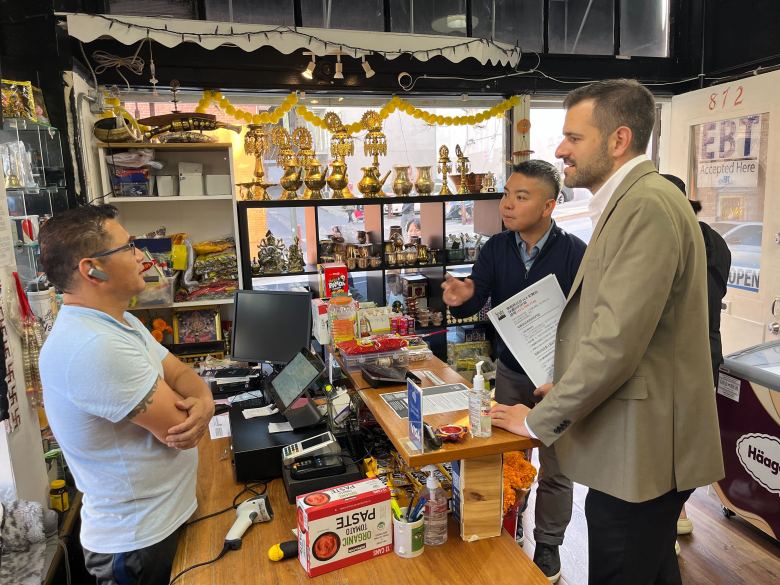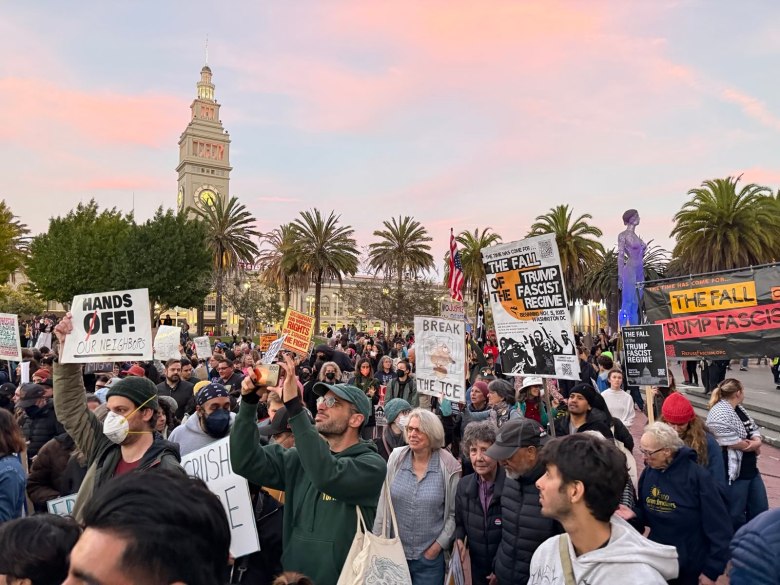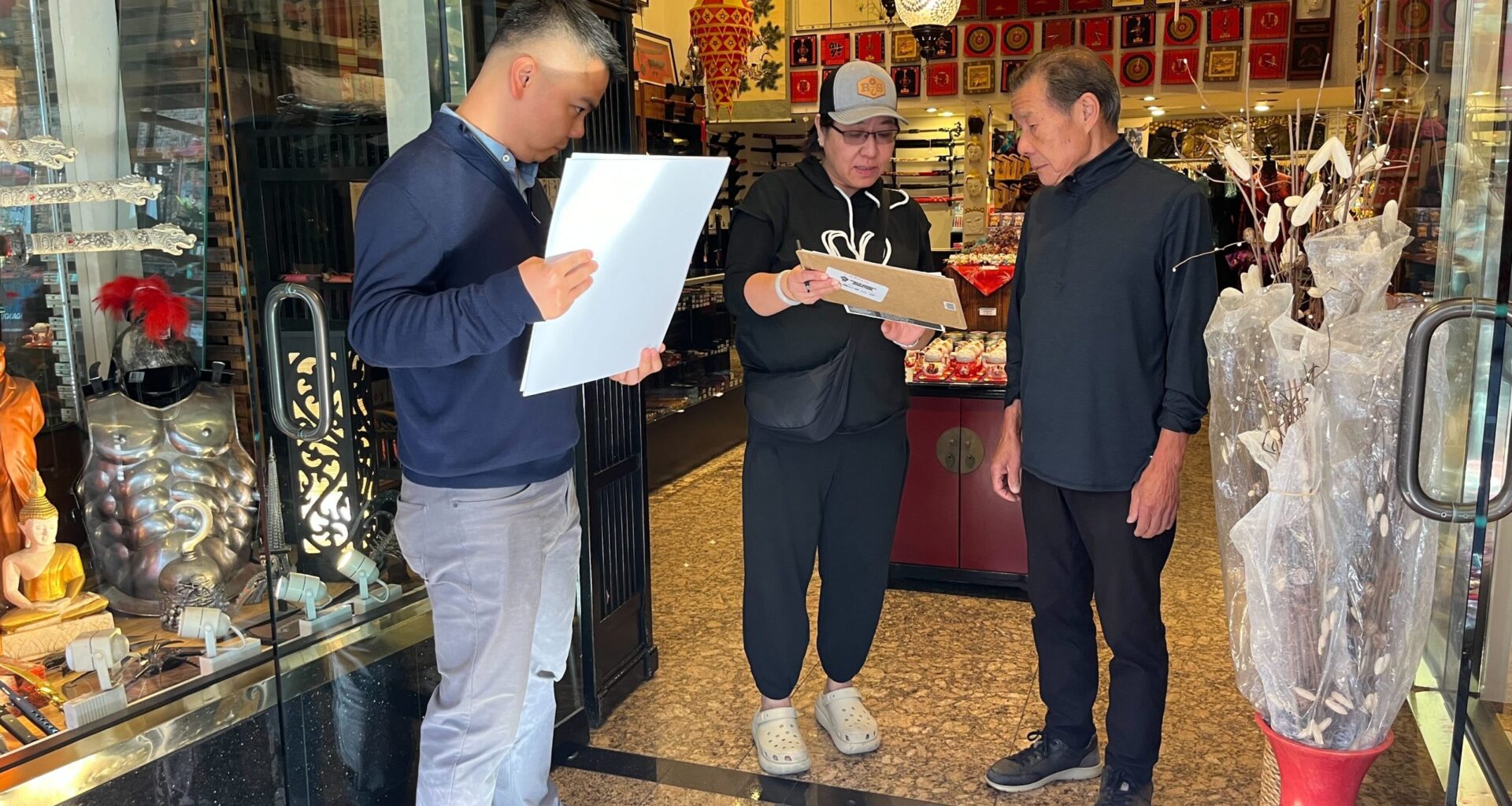For months, Jose Ng has visited Chinatown storefronts, handing out information and hosting workshops on residents’ rights in interactions with federal agents if U.S. Immigration and Customs Enforcement or Customs and Border Protection show up at their doors.
Until this week, those sessions were mostly precautionary. Now, the threat feels real.
“People haven’t really thought about, ‘Oh, Chinatown might be impacted by immigration raids,’” said Ng, who manages the immigrant rights program at the local nonprofit advocacy group Chinese for Affirmative Action. “Then it happened in New York City, and now we’re seeing the arrival of ICE and CBP agents in the Bay Area.”
Now news of raids has put communities on edge. On Tuesday afternoon, videos of ICE agents raiding New York City’s Chinatown began circulating online. The following day, news about more than 100 federal immigration agents being dispatched to the Bay Area dominated the headlines. Though the next day President Donald Trump called off the “surge” of federal agents after a phone call with San Francisco Mayor Daniel Lurie, fears of intensified operations persist.
As a historic cultural enclave for generations of immigrants, the neighborhood had taken some precautions for potential raids, but few anticipated being directly targeted. That assumption has now shifted.
“My phone has been blowing up lately,” said Ng, who added that he has been getting more calls from community partners, especially immigrant-serving organizations, seeking training on how to respond to immigration raids.
“The community is more motivated to get prepared right now,” he said. “Maybe this is a wake-up call.”
Since the start of the Trump administration, Chinatown groups have held discussions about the possibility that immigration agency actions or mass protests opposing them would reignite fear and uncertainty in the neighborhood. With the community still recovering from the economic fallout from the COVID-19 pandemic, local leaders worried that renewed anxiety could jeopardize the fragile gains and slow the return of visitors.
But developments over the past week have heightened those concerns.
 Jose Ng, center, talks with a store clerk in Chinatown, alongside District 3 Supervisor Danny Sauter, right. Credit: Audrey Mei Yi Brown / San Francisco Public Press
Jose Ng, center, talks with a store clerk in Chinatown, alongside District 3 Supervisor Danny Sauter, right. Credit: Audrey Mei Yi Brown / San Francisco Public Press
“We have to prepare for the worst,” said Donald Luu, president of the San Francisco Chinese Chamber of Commerce, noting that local organizations have been stepping up coordination in case more federal agents appear in the neighborhood.
Luu added he felt “joyful but cautious” that after a phone call with Lurie, Trump canceled the planned “surge” of federal agents. Still, local organizations have not let their guard down.
Joyce Lam, political director at the local nonprofit Chinese Progressive Association, said she has already seen signs of fear and confusion in the community. “Some of our members told us they now carry their green cards with them whenever they go out,” Lam said, speaking in Cantonese.
She said many residents her organization serves are U.S. citizens or permanent residents who nonetheless fear harassment from federal forces who might racially profile them.
“At first, many people thought immigration enforcement had nothing to do with them,” she said. “But now, they are seeing some of these federal agents carry out actions regardless of one’s status, with news reports saying they don’t care about your status, that they might detain you first and only release you after checking. It’s really frightening.”
 In reaction to news reports that federal officials might be deployed to San Francisco — a move called off at the last minute — anti-Trump protesters flooded the Embarcadero Plaza Thursday, directing much of their ire at Immigration and Customs Enforcement. Credit: Lila LaHood / San Francisco Public Press
In reaction to news reports that federal officials might be deployed to San Francisco — a move called off at the last minute — anti-Trump protesters flooded the Embarcadero Plaza Thursday, directing much of their ire at Immigration and Customs Enforcement. Credit: Lila LaHood / San Francisco Public Press
Asian and Pacific Islander communities have been on high alert for months about the prospect of members being targeted. Still, immigration status has been a sensitive topic people rarely talk about, Ng said. “People just want to put it under the rug,” he said, noting that many Chinese asylum seekers are reluctant to share their experiences publicly, for fear of government reprisals.
Ng also highlighted the complexity of the immigration system as an added challenge: “One day you could be undocumented, the next day you could be documented.” Legal status is often tied to many factors beyond a person’s control, such as changing policies and job status.
Yet this fear of sharing information often leaves people isolated and less likely to access helpful resources.
“I feel like people have been living in the dark,” Ng said.
Community leaders say having accurate information about immigration and legal rights helps residents feel less afraid in uncertain times. The Public Press recently published a multilingual resource guide for noncitizens of various immigration statuses to help them prepare for possible enforcement actions: https://www.sfpublicpress.org/how-to-prepare-for-immigration-enforcement
Related

